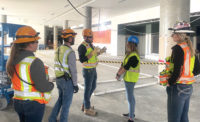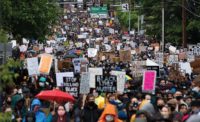In less than a year, California Senate Bill 1 raised billions for state transportation infrastructure, with thousands of projects underway.
But a Nov. 6 state ballot initiative that aims to repeal the new gas taxes and vehicles fee has galvanized the state construction industry, which has joined a coalition of municipalities, labor and environmental groups, and others to protect a funding stream that generates about $5.5 billion a year.
Proposition 6 is one of 300 state and local transportation funding and related measures on U.S. ballots that the American Road &Transportation Builders Association's Transportation Investment Advocacy Center is tracking, says Carolyn Kramer, a spokeswoman for the group. It also is monitoring campaigns of 800 state lawmakers facing re-election who voted on gas-tax increase bills.
Advocates and opponents are closely watching Prop 6. The controversial anti-tax measure would repeal the 12-cent-a-gallon gas tax hike and vehicle fee increase enacted in April 2017, and require voter approval for future increases.
Anti-tax proponents have raised more than $4 million to support the effort, but opponents have outspent them nearly 10 to 1.
More than 500 groups and organizations have united through the group California Alliance for Jobs to defeat Prop 6, says Associated General Contractors of California CEO Peter Tateishi. “It’s a huge coalition of people who don’t usually come together on issues.”
Prop 6 is a “grave threat” to transportation infrastructure funding, says Emily Cohen, executive vice president of the 300-member United Contractors, which contributed $9 million to opposing it. “These projects would be fighting for general monies or relying on bonds to fix our roads forever.”
Opponents Lead, For Now
Despite the cash infusion, a Sept. 26 poll by the nonpartisan Public Policy Institute of California indicated that about 52% of voters queried said they would vote no, 39% indicated yes and 8% were undecided.
“The polls [as of mid-September] show it as likely to be defeated, but it’s still early and the public arguments are still ahead of us,” said Martin Wachs, professor emeritus of urban planning at UCLA. He is lead author of a report by the Mineta Transportation Institute at San Jose State University that projects California will lose $100 billion in transportation revenue between now and 2040 if voters repeal the tax measure.
“The most recent propositions about transportation in California have generally been to protect the gas tax revenue for transportation from what’s called diversion … so voters have typically been very favorable toward transportation spending in California when it’s committed to transportation,” he said in a podcast for the Eno Center for Transportation, a Washington, D.C., think tank.
About state 6,500 bridge, road and public transit improvement projects are already underway.
Among Prop 6 opponents, Granite Construction contributed $500,000. Bay Area infrastructure contractor Ghilotti Bros. will have donated about $150,000 to the “No to Prop 6” campaign by Election Day, says president Mike Ghilotti. “There is a concern about how much everybody’s getting taxed, but [it] pales in comparison to what you spend rebuilding the front end [of a vehicle] and replacing the tires and all the other damage that comes from the poor roads.”
The State Building and Construction Trades Council of California, representing almost 500,000 workers, also is working against Prop 6, says President Robbie Hunter.
“It’s more than just employment. It’s infrastructure employment and that’s the kind of employment that moves the economy, in good times and bad.”
ARTBA Chief Economist Alison Black says she lacks “a crystal ball on what will happen,” but contends that Prop 6 passage will risk not only SB-1’s billions now but also “the additional economic benefit of that investment for decades to come.”
She adds that “it also sets a dangerous precedent when transportation investment is used as a wedge issue; this debate is not actually about transportation funding, but about politics.”
Gas tax and transportation funding measures, totaling about $9.5 billion, also are set in Colorado, with two that fund projects differently, one from a tax hike and the other from the state’s general fund. “It will be interesting to see which one voters prefer,” says Alexander Laska, an Eno Center spokesman.
In Missouri, the first gas tax increase since the 1990s, a 10-cent-per gallon hike set to raise $400 million annually, has surprising bipartisan support from state legislators, he says.
Lock-box measures to protect transportation funding are up for a vote in Connecticut and Louisiana. ARTBA's Kramer says these are "an indicator of future intent to raise taxes and fees in these accounts."
Among non-transportation measures set for a vote next month, according to Ballotpedia, are initiatives in Arizona and Nevada financed by environmentalists, to mandate utilities to get 50% of their power from renewable sources. Washington state is again pushing forward a measure to set per-ton fees on carbon emissions from power plants, refineries and other industrials sources. Nevadans also will vote on whether to deregulate the state's energy market.
A Colorado proposition—that media described as one of the most expensive in state history based on miliions invested by both sides—would mandate that new oil and gas projects, including fracking, be located a minimum of 2,500 ft from occupied buildings and other areas designated as vulnerable
Also, Baltimore’s City Council approved a ballot measure that gives voters a chance to ban privatization of the city water and sewer system. Passage would make Baltimore the first U.S. city to do so, say local media reports.







Post a comment to this article
Report Abusive Comment